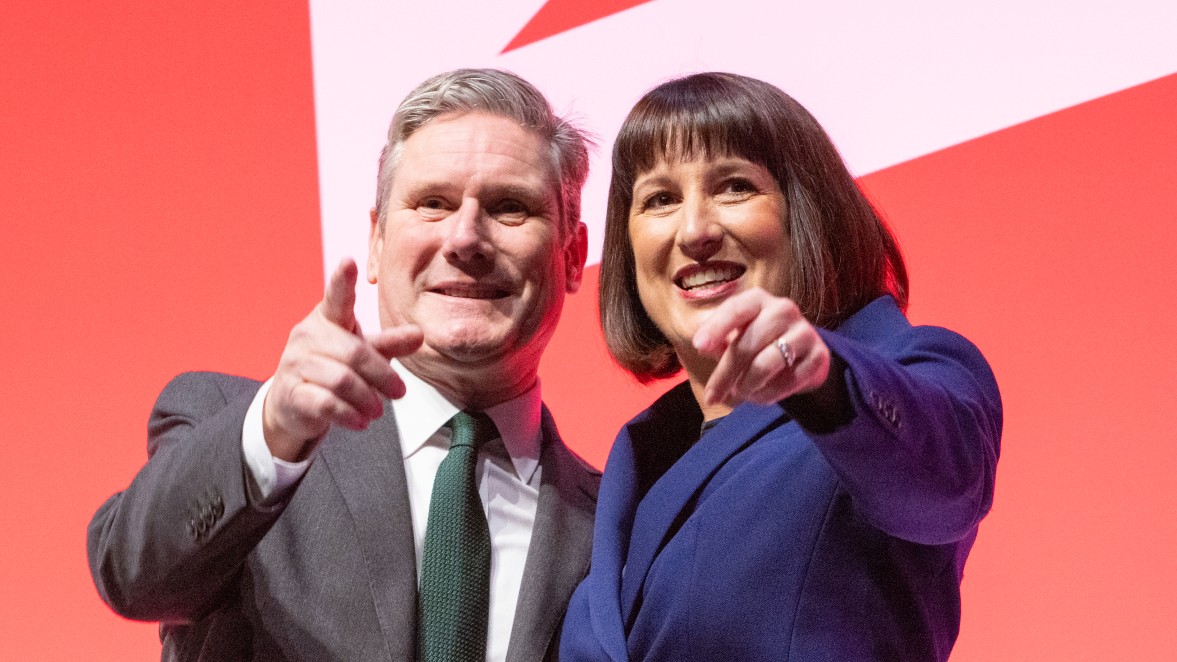Labour's big pitch to big business
Keir Starmer promises economic stability but owes much to his 'boring, snoring' shadow chancellor

A free daily email with the biggest news stories of the day – and the best features from TheWeek.com
You are now subscribed
Your newsletter sign-up was successful
Keir Starmer today promised to "do the hard yards" to fix the economy, in a critical bid to win over businesses ahead of the next election.
Unveiling his party's plan to reverse wage stagnation and boost growth, Starmer said the attendance of 400 corporate leaders at the launch event, in central London, showed the "depth of the changes we've made to transform the Labour Party's relationship with business". That tickets reportedly sold out within hours "suggests it is pushing on an open door", said the Financial Times's leader column.
It is the culmination of a remarkable journey for the party since 2019. After the 2008 financial crisis occurred on Labour's watch, Jeremy Corbyn's time as leader did little to improve the image of Labour's economic competence. But five years on – and following Liz Truss's disastrous short-lived tenure as PM – the tables have turned, with research by polling firm Redfield and Wilton Strategies suggesting the public now trust Labour more on the economy than the Conservatives.
The Week
Escape your echo chamber. Get the facts behind the news, plus analysis from multiple perspectives.

Sign up for The Week's Free Newsletters
From our morning news briefing to a weekly Good News Newsletter, get the best of The Week delivered directly to your inbox.
From our morning news briefing to a weekly Good News Newsletter, get the best of The Week delivered directly to your inbox.
'Boring, snoring' right-hand woman
Labour's new-found reputation for fiscal responsibility is largely down to the party's shadow chancellor, Rachel Reeves.
Once a Labour outcast, dismissed by Corbyn as too right-wing and derided by a TV executive as "boring, snoring", her "relentlessly pro-business, pro-caution approach chimes with the 'no drama Starmer' image that the Labour leader had cultivated", said Politico, "in contrast to the chaotic governing Tories".
Such is the sway that the former Bank of England economist now holds over the party, she topped The New Statesman's "left power list" last year, beating her boss into second place.
Crucially, Starmer "needs business help to deliver the growth that is at the heart of his agenda", said the FT. Although "little detail" has been provided yet, said Sky News, the headlines set out today include a promise "to get Britain building again after 14 years of stagnation"; "plans for skills to drive growth"; "the need to partner with business to make work pay for working people"; "backing British business"; and "creating the stable economic conditions required for delivering growth".
A free daily email with the biggest news stories of the day – and the best features from TheWeek.com
'Unhappy times to come'
The new-found love-in between Labour and business is not without its critics, however.
Yesterday, Reeves announced the party would not reinstate the cap on bankers' bonuses scrapped by Liz Truss – "less than 100 days after her own Treasury team lambasted the move", said Steerpike in The Spectator. "The move is part of Labour's big push to prove they're on the side of business," said the columnist, and "tells you everything you need to know" about the current Labour Party.
Then there is Labour's £28 billion-a-year Green Prosperity Plan. The fate of the flagship economic policy "has become the Ark of the Covenant", said Andrew Marr in The New Statesman, "furiously contested between Israelites and Philistines". As reported last year, the true figure has been diminished by already committed government spending, "and had been put off until the midterm of any Labour government". And "it may soon disappear completely", Marr predicted.
After what Steerpike called "another Labour U-turn" on the economy, some – including Scottish Labour leader Anas Sarwar – have signalled that the party must ensure "fairness" alongside its attempt to win over business in the hope of boosting growth.
James Schneider, Labour's director of strategic communications under Corbyn, went further. He told Politico there are "unhappy times to come, given that on current trends, and applying Labour's publicly stated policies to trend outcomes, most people in the country will be less well off two years into Labour governments than they are at the beginning".
-
 Political cartoons for February 12
Political cartoons for February 12Cartoons Thursday's political cartoons include a Pam Bondi performance, Ghislaine Maxwell on tour, and ICE detention facilities
-
 Arcadia: Tom Stoppard’s ‘masterpiece’ makes a ‘triumphant’ return
Arcadia: Tom Stoppard’s ‘masterpiece’ makes a ‘triumphant’ returnThe Week Recommends Carrie Cracknell’s revival at the Old Vic ‘grips like a thriller’
-
 My Father’s Shadow: a ‘magically nimble’ film
My Father’s Shadow: a ‘magically nimble’ filmThe Week Recommends Akinola Davies Jr’s touching and ‘tender’ tale of two brothers in 1990s Nigeria
-
 Is the US in a hiring recession?
Is the US in a hiring recession?Today's Big Question The economy is growing. Job openings are not.
-
 Trump wants a weaker dollar, but economists aren’t so sure
Trump wants a weaker dollar, but economists aren’t so sureTalking Points A weaker dollar can make imports more expensive but also boost gold
-
 Tariffs have American whiskey distillers on the rocks
Tariffs have American whiskey distillers on the rocksIn the Spotlight Jim Beam is the latest brand to feel the pain
-
 The longevity economy booms as people live longer
The longevity economy booms as people live longerThe Explainer The sector is projected to reach $27 trillion by 2030
-
 How will China’s $1 trillion trade surplus change the world economy?
How will China’s $1 trillion trade surplus change the world economy?Today’s Big Question Europe may impose its own tariffs
-
 Texas is trying to become America’s next financial hub
Texas is trying to become America’s next financial hubIn the Spotlight The Lone Star State could soon have three major stock exchanges
-
 Employees are branching out rather than moving up with career minimalism
Employees are branching out rather than moving up with career minimalismThe explainer From career ladder to lily pad
-
 Who will be the next Fed chair?
Who will be the next Fed chair?Today's Big Question Kevin Hassett appears to be Trump’s pick